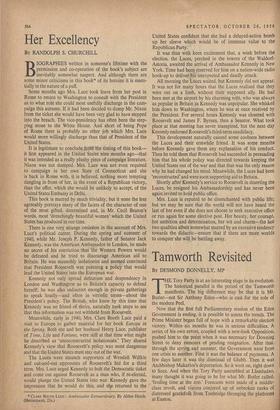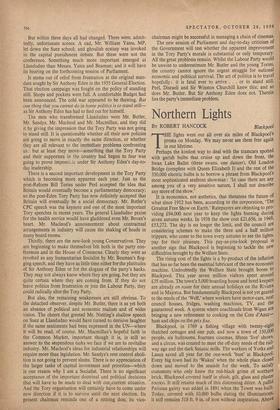Tamworth Revisited
BY DESMOND DONNELLY, MP THE Tory Party is at an interesting stage in its evolution. The historical parallel is the period of the Tamworth manifesto. The big difference may be that it is Mr. Butler—not Sir Anthony Eden—who is cast for the role of the modern Peel.
Now that the first full Parliamentary session of the Eden Government is ending, it is possible to assess the trends. The Prime Minister began full of hope with a remarkable election victory. Within six months he was in serious difficulties. A series of his own errors, coupled with a new-look Opposition. pushed him to the point when it was necessary for Downing Street to deny rumours of pending resignation. After that, through the spring and summer, the Government went from one crisis to another. First it was the balance of payments. A few days later it was the dismissal of Glubb. Then it was Archbishop Makarios's deportation. So it went on, right down to Suez. And when the Tory Party assembled at Llandudno, many thought it was going to be for what Mr. Butler called, `feeding time at the zoo.' Forecasts were made of a middle- class revolt, and visions conjured up of unbroken ranks of distressed gentlefolk from Tonbridge thronging the platforms at Euston. But within three days all had changed. There were, admit- tedly, unfortunate scenes. A cad, Mr. William Yates, MP, let down the Suez school; and ghoulish ecstasy was invoked in the capital punishment debate. But these were not the conference. Something much more important emerged at Llandudno than Messrs. Yates and Beaman; and it will have its bearing on the forthcoming session of Parliament.
It stems out of relief from frustration at the original man- date sought by Sir Anthony Eden in the 1955 General Election.
That election campaign. was fought on the policy of standing still. Shops and pockets were full. A comfortable Budget had been announced. The cold war appeared to be thawing. But one thing that you cannot do in home politics is to stand still— as Sir Anthony Eden has had to find out for himself.
The men who transformed Llandudno were Mr. Butler, Mr. Sandys, Mr. Macleod and Mr. Macmillan, and they did it by giving the impression that the Tory Party was not going to stand still. It is questionable whether all their new policies are going to move in exactly the same direction, or whether they are all relevant to the immediate problems confronting us : but at least they move—something that the Tory Party and their supporters in the country had begun to fear was going to prove impossiLle under Sir Anthony Eden's day-to- day leadership.
There is a second important development in the Tory Party which is becoming more apparent each year. Just as the post-Reform Bill Tories under Peel accepted the idea that Britain would eventually become a parliamentary democracy; so the post-Eden Tory Party has now definitely accepted that Britain will eventually be a social democracy. Mr. Butler's CPC speech was the keynote and one of the most important Tory speeches in recent years. The general Llandudno praise for the health service would have gladdened even Mr. Bevan's heart. Mr. Macleod's announcement about contractual arrangements in industry will cause the shaking of heads in many board rooms.
Thirdly, there are the new-look young Conservatives. They are beginning to make themselves felt both in the party con- ferences and in the House of Commons. Clearly they were as revolted as any humanitarian Socialist by Mr. Beaman's flog- ging speech, and they have as little time either for the platitudes of Sir Anthony Eden or for the slogans of the party's hacks. They may not always know where they are going, but they are quite certain where they are coming from. If they do not leave politics from frustration or join the Labour Party, they could radically alter the Tory Party.
But alas, the remaining weaknesses are still obvious. To the detached observer, despite Mr. Butler, there is as yet both an absence of political and economic realism and of wider vision. The cheers that greeted Mr. Nutting's shallow speech on Suez at Llandudno would have turned to derisive laughter if the same sentiments had been expressed in the UN—where it will be read, of course. Mr. Macmillan's hopeful faith in the Common Market, important though it is, is still no answer to the stupendous tasks we face if we are to revitalise industry. Mr. Macleod's ideas for industrial relationships will require more than legislation. Mr. Sandys's rent control aboli- tion is not going to prevent slums. There is no appreciation of the larger tasks of capital investment and priorities—which is one reason why I am a Socialist. There is no significant acceptance of the important doctrinal and political decisions that will have to be made to deal with our;,curient situation. And the Tory organisation will certainly have to come under new direction if it is to survive until the next election. Its present chairman reminds one of a retiring don; its vice- chairman might be successful in managing a chain of cinemas. The new session of Parliament and day-to-day criticism of the Government will test whether the apparent improvement in the Tory Party's morale is substantial or only temporary. All the great problems remain. Whilst the Labour Party would be unwise to underestimate Mr. Butler and the young Tories, the country cannot ignore the urgent stryggle for national economic and political survival. The art of politics is to travel hopefully : it is fatal ever to arrive . . . or to stand still. Peel, Disraeli and Sir Winston Churchill knew this; and so does Mr. Butler. But Sir Anthony Eden does not. Therein lies the party's immediate problem.











































 Previous page
Previous page